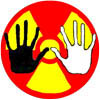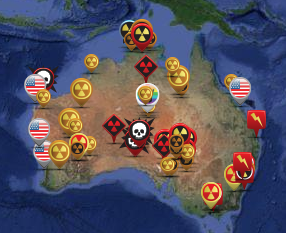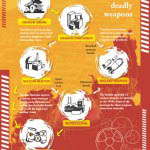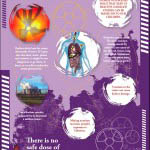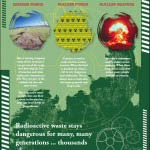The 2008 Alliance meeting was held on Limilngan country near the Mary River, in the top end of the Northern Territory from August 29-31.
The meeting celebrated 11 years of solidarity and e”ective resistance to the nuclear industry in Australia. Alliance members rea!rmed their commitment to continue active campaigning for a nuclear free Australia and agreed on a range of plans and strategies for the coming year.
The meeting elected an Alliance Committee to increase capacity to effectively campaign for a nuclear-free future.
The Alliance committed to work towards global peace and building a broad alliance to end the nuclear chain.
Meeting participants agreed on the following statements:
URANIUM
The Alliance affirmed strong opposition to uranium exploration and mining, expressing concerns about the health e”ects on community and environment, including bush foods and water. Many participants object to the lack of meaningful and respectful consultation about uranium exploration and mining, for example the Aboriginal Land Rights Act (NT) laws that roll exploration and mining consent into one process – the meeting called for this process to be separated. Rehabilitation of poisoned lands is not guaranteed or trusted.
The meeting noted and supported the continuing opposition of the WA and Queensland governments to uranium mining and called on those governments to maintain these bans.
The meeting expressed concern about the unsustainable use and pollution of precious and threatened water resources by uranium mining and processing. Examples include the destruction of Mound Springs on Arabunna land by the extraction of up to 42 million litres of water daily for the Roxby Downs (Olympic Dam) mine; the pollution of wetlands in Kakadu by a series of leaks and spills from the Ranger mine; and the pollution of groundwater on Adnyamathanha land from the Beverley mine with no requirement to rehabilitate polluted water. The meeting condemned the recent decision of federal environment minister Peter Garrett to approve an expansion of the Beverley mine.
The meeting noted that Australia’s uranium exports contribute to water problems overseas because nuclear power consumes more water than any other energy source. The meeting agreed to work together to continue to raise issues about water use and pollution by the nuclear chain, including during National Water Week in October 2008.
The meeting expressed concern about the risk of Australian uranium contributing to the proliferation of nuclear weapons. The meeting expressed opposition to the dangerous lie that so-called ‘safeguards’ will prevent military use of Australian uranium.
As a dirty, dangerous and non-renewable resource with clear links to the proliferation of Weapons of Mass Destruction, nuclear power was recognised as no answer to climate change.
RADIOACTIVE WASTE DUMP
The Alliance heard the continued and emphatic opposition by Traditional Owners and a”ected communities to the proposed federal radioactive waste dump in the NT and will continue to work together to end this threat.
The meeting condemned federal energy and resources minister Martin Ferguson for failing to repeal the racist Commonwealth Radioactive Waste Management Act which allows for the dumping of nuclear waste on Aboriginal land without consultation or consent. Repeal of this law was a clear promise before the 2007 federal election and the meeting called on Prime Minister Rudd to direct Mr Ferguson to repeal the Act.
The Alliance continues to strongly oppose the dumping of radioactive waste in the Northern Territory.
LAND RIGHTS / INTERVENTION
The meeting committed to ongoing support for Indigenous people defending country, culture and communities and for the right to assert sovereignty.
The meeting expressed strong concerns over land rights, the native title system and the NT intervention. The current federal intervention in the NT undermines Indigenous rights. Removing communities rights to control land will never improve their ability to control their lives.
The Alliance calls upon the government to end the NT intervention and end the nuclear industry in Australia.
The meeting was attended by representatives and traditional custodians of the:
Larrakia, Wulna, Arrernte, Warlpiri, Pitjantjatjara, Pambalong Clan from Kattung Nation, Wiradjeri Arabunna, Adnyamathanha, Kokatha Mula and Kokatha Nations,
and by representatives of :
Top End Aboriginal Conservation Alliance Arid Lands Environment Centre International Campaign to Abolish Nuclear Weapons Medical Association for Prevention of War Friends of the Earth Australian Conservation Foundation Environment Centre of the NT Darwin Aboriginal Rights Coalition Australian Greens Queensland Nuclear Free Alliance Australian Students Environment Network No Waste Alliance Beyond Nuclear Initiative and Mineral Policy Institute.
